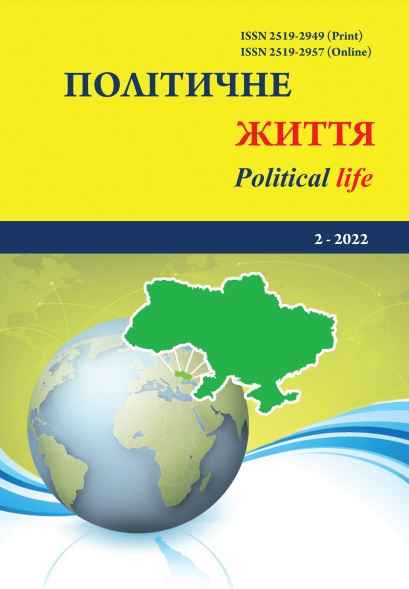Homo Sacer and the Challenge of the Enemy’s Subjectivity in the Conditions of the Russian-Ukrainian War
DOI:
https://doi.org/10.31558/2519-2949.2022.2.3Keywords:
war; military; enemy; orcs; homo sacerAbstract
It is hypothesized that the use of various archetypes of demonization of the enemy (on the example of the Russian military), creates a plurality of symbolic spaces. This not only makes its adjustments to the subjectivity of the real enemy during the transfer from the mythological space to the political space, but also leads to the conceptual obfuscation of the enemy. The practice of transferring borrowed elements from one space to another can reduce the enemy’s responsibility for their crimes. The transposition of a mythological subject from one world to another creates another matrix of meanings that affects political reality. Symbolic structures are constants that establish knowledge to pass on to others. When the enemy is perceived as a mythological subject, the attitude towards them can be as an imaginary subject. There is a risk of a distorted understanding of their political behavior, political subjectivity and political responsibility.
Political consciousness ensures the interaction of political actors. This is manifested in the characteristics and characteristics of the participants in political interaction. The dominance of mythological characters gives political reality a postmodernist understanding of paradox. When the enemy is positioned as an "orc", there is a risk of losing the causal link of their political actions. Because they are a representative of the mythological world, while their crimes and victims are in the real world. If there is a war on exports, the enemy clearly shifted the legal order of life in the occupied territory. Victims become at the situation of “naked life”, like D. Agamben is calling it an object of power. During the creation of the conditions of naked life, a person’s value is questioned, so the status of a citizen is removed from social and legal laws. They become homo sacer who can be destroyed without guilt or responsibility. The sacer man becomes sacred in the sense of depriving his life, and for the enemy himself such sacredness consists in saving others. During World War II, the Nazis denationalized Jews and Gipsy and then sent them to death camps. Today, the Russian authorities announced to Ukraine the so-called "Denazification", and the Russian military form filtration camps and exterminate Ukrainians as a nation. And such a policy of "naked life" is pursued in Ukraine not by mythical characters "orcs", but by real people. Who should be responsible for this crime.
References
Вертикаль. Телеграмканал, (2022). ВСУ уничтожили более 50 орков… URL: https://t.me/vert_i_call/3770 (дата звернення: 27.05.2022).
Есхіл, (2003). Перси. URL: https://www.ukrlib.com.ua/world/printit.php?tid=3019
Женевська конвенція про поводження з військовополоненим, (2006). https://zakon.rada.gov.ua/laws/show/995_153#Text (дата звернення: 08.05.2022).
Куцик А., (2021). Християнські цінності, образи та підтексти в книзі Дж. Р. Р. Толкіна «Сильмариліон». Актуальні питання гуманітарних наук. С. 140 – 143.
Ларіна К., (2022). Важливо називати росіян росіянами, а путіна – путіним. URL: https://www.facebook.com/100004843546512/posts/1932832833554816/ (дата звернення: 08.04.2022).
Суспільне. Культура, (2022). Етнічні чистки: на державному російському сайті вийшла стаття «Що Росія має зробити з Україною». URL: https://suspilne.media/225052-etnicni-cistki-na-derzavnomu-rosijskomu-sajtivijsla-statta-so-rosia-mae-zrobiti-z-ukrainou/ (дата звернення: 27.05.2022).
Труха. Телеграмканал, (2022). Приключения свинособак в Украине: карта русских мародеров. URL: https://t.me/truexanewsua/48402 (дата звернення: 27.05.2022).
Труха. Телеграмканал, (2022). «Мы пришли, теперь будет порядок». URL: ttps://t.me/truexanewsua/48495 (дата звернення: 27.05.2022).
Фашик Донецький. Телеграмканал, (2022). Орки страждають від власної тупості. URL: https://t.me/gistapapapa/35089 (дата звернення: 27.05.2022).
Agamben G. (1998). Homo Sacer. Sovereign Power and Bare Life. 228 p.
Lasswell H.D. (1938). Propaganda technique in the World War. N.Y. : Peter Smith, 237 p.
Mill, J. S. (1984). A few words on non-intervention [1859]. In: J. Robson (Ed.), Essays on equality, law, and education (pp. 111–124). Toronto: University of Toronto Press.
Nietzsche F. (2007). Zur Genealogie der Moral. 160 р.
Sloterdijk P. (1999). Sphären II. Globen, Makrosphärologie. Spheres II. 1016 р.
Schmitt, C. (1996). In: G. Schwab (Trans.), The concept of the political. Chicago: University of Chicago Press. (Original work published in 1932.)
Schmitt, C. (2002). Theorie des Partisanen: Zwischenbemerkungen zum Begriff des Politischen [1963] (5th ed.). Berlin: Duncker & Humblot.
Wilke, C. (2007). Law’s Enemies: Enemy Concepts in US Supreme Court Decisions. In Studiesin Law, Politics and Society. Emerald Group Publishing Limited. Р. 41 – 77.

